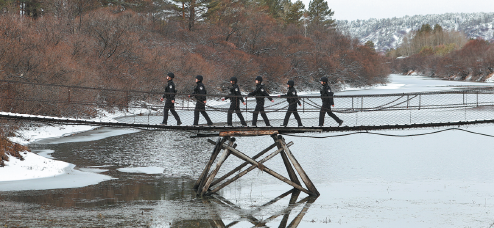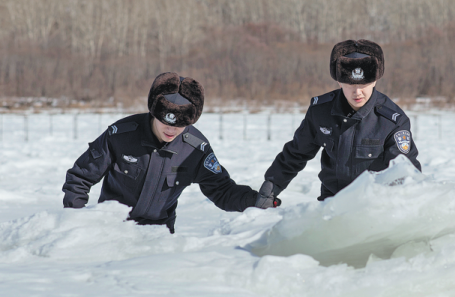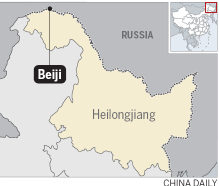Guards endure extremes to keep border safe
Police at China's most-northerly frontier outpost are battered by icy winds as temperatures plummet and rivers freeze. Cui Jia reports from Beiji, Heilongjiang.

Editor's note: This is the sixth in a series of stories about China's border patrol guards, focusing on the challenges they face and their work to keep the country safe, prevent trafficking of drugs and people, and maintain friendly relations with their counterparts in neighboring countries.
Residents of Beiji township, Heilongjiang province, believe visitors come to their town for three main reasons: to say they have set foot on China's most northerly point; to experience the extreme cold; and to see the certified "Santa Claus" from Finland, who is stationed there as a tourist attraction during the Christmas holiday season.
But for National Immigration Administration officers at the local border control station, the very things that draw people to Beiji-literately "north pole" in Mandarin-are the biggest obstacles to keeping their 2,798-square-kilometer stretch of the 173-kilometer border with Russia free from trouble.
"Inspecting Santa's documents is a piece of cake, because the administration's latest mobile phone app means it only takes a few minutes to make sure he's here legally," said officer Zhang Chunmao, while inspecting a vehicle entering a village, also named Beiji, where the station is located.
The settlement-population 2,204, and the best place in China to observe the Northern Lights-is surrounded by pine forests of the Greater Khingan Range on three sides and the Heilongjiang River, which acts as the border, on the other.
According to the China Meteorology Administration, the annual average temperature in the village is-5 C, but it can fall to-50 C or lower.
"When the Heilongjiang River becomes completely frozen at the end of November, people can easily cross the centerline, which forms the actual border, so that's when we start patrolling on foot," Zhang said.
A sparsely populated, frost-covered forested area of Russia lies on the other side of the river, and a lonely outpost marks the presence of the Russian border control force.
"No protective gear can save us from the gales on the frozen river in extremely cold temperatures, but it's our duty to be there," Zhang, 27, said, noting that -38 C is the lowest temperature recorded in the village so far this year.
Cao Youfeng, deputy head of the Mohe Public Security Bureau's Border Control Brigade, said: "When the river freezes, the surface is not as flat as many people assume. Actually, it's very uneven, and the wind is unbearable. The officers can only patrol about 8 km in a day. That's how difficult it is."
Zhu Fuchao, the officer in charge of Beihong, a village about 100 km east of Beiji, said the officers have learned enough tricks to ensure their daily routines are not affected by the extreme weather.
"In winter, you must wear gloves at all times to touch the door handles of the patrol car. Trust me, it is extremely unpleasant to have the skin of your hands freeze to a handle," he said. "Giving the door a good kick before opening it is another thing we've become used to, because it freezes to the frame overnight."
Cao said the station uses the latest technology, such as an integrated border surveillance system and drone patrols, to improve the efficiency of law enforcement in extreme weather.
"Although Beiji station is on the border, the law enforcement technologies we use are just as advanced as those in big cities," he added.
Like many at the station, Zhang is simultaneously a first-generation National Immigration Administration officer and a last-generation Chinese Armed Police Force Border Defense officer.
In April last year, the NIA was established as a part of the government's structural reform. It has combined the Ministry of Public Security's Entry and Exit Management and Frontier Inspection departments, although it is still under the ministry's management.
"Since the NIA was established, the police station's focus has shifted from preventing people from crossing the border illegally to keeping the whole border area stable," Cao said. "Having a trouble-free border area is the foundation of safeguarding the frontier."
Helping the locals
Zhang said, "It's all about taking people's problems seriously, no matter how big or small they are."
In 2017, an elderly woman from Beiji village visited the police station because she suspected that two ducks had been stolen from her shed.
Zhang and another officer pieced together surveillance camera footage to observe the ducks' tracks.
"It turned out that they had been killed by stray dogs after wandering onto the street. The woman told us that she really appreciated the efforts we had made to help her," he said. "Serving the locals is an important part of border defense work."
There has not been a major crime in the Beiji area since 2002, and the rate of offending is extremely low. However, the officers' workload increased significantly after the once-isolated settlement became the holy grail of "north seekers". During the peak season, it can receive 40,000 tourists.
The Chinese expression "Looking for the north" means seeking a direction, so many people decide to head to Beiji township to show that they have at least tried. Even the police station has become a tourist attraction because it is the most northerly in China.
In the past, the villagers mainly relied on the lumber trade to make a living, but tourism became the key source of income after 2014, when all commercial lumbering was banned in the Greater Khingan Range.
Danger
"The 'north seekers' have brought more income for us. But sometimes they put themselves in danger by underestimating what extreme cold can do," said Cui Yujie, a villager who provides bed and breakfast.
Wang Zi, an officer who has taken part in many rescue missions, said some tourists from southern China who have never seen snow before get overexcited and drive on snowy lanes in the forests, rather than sealed roads.
"If their cars break down, we have to locate them quickly so they won't freeze to death," he said.
More than 60 percent of the cases the station handles every year are related to searches for tourists, and over 100 have been rescued in the past two years.
"Some just don't think it's a big deal to cross the centerline of the frozen river for a few minutes to pose for a photo. I always tell them that such behavior will not be tolerated by the NIA officers," said Li Liang, a guide accompanying a group of tourists from the United States, who were sending postcards to loved ones at home.
In 2016, Zhang Yanbo became a member of the station in Beiji village, which has a history of more than 70 years.
"It's only since I started patrolling, passing one boundary stone after another, that I have realized what territorial integrity really means, and what people have done to protect it," said the 26-year-old, who grew up in a city.
"China's most northerly border area will be kept safe under our watch."



Today's Top News
- Namibian FM highlights China's role in progress
- Policy effort to bolster growth bears fruit
- Xizang's first guide dog helps his owner break barriers
- Thai court suspends PM over leaked call
- Xi stresses building unified national market, promoting marine economy's high-quality development
- A tale of two intellectual paradigms






























